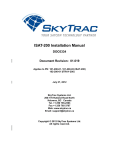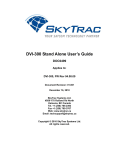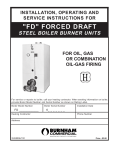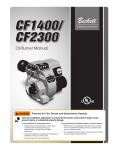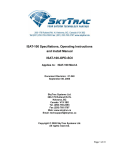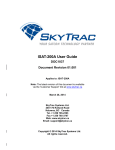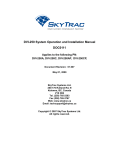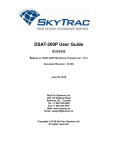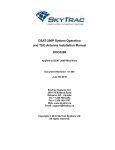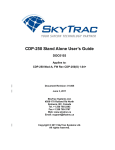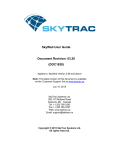Download CDP-300 Installation Manual
Transcript
CDP-300 Installation Manual DOC0449 Applies to PN: 104-300-01, 104-300-02 Document Revision: 01.005 March 4, 2013 SkyTrac Systems Ltd. 200-170 Rutland Road North Kelowna, BC Canada Tel. +1 250 765-2393 Fax +1 250 765-3767 Web: www.skytrac.ca Email: [email protected] Copyright © 2013 SkyTrac Systems Ltd. All rights reserved. SkyTrac Systems Ltd. Document Revision History Rev 01.000 ECO 172 01.001 283 01.002 266 01.003 368 01.004 427 01.005 466 Description Initial Release Incremented revision number for document version control. Corrected title of section 2.2. Added short term operating temperature in 2.4 Added warranty period starts from date of purchase from SkyTrac Systems Corrected warranty statement. Added ESD caution. Removed approval column from revision history. Corrected qualification string and table in section 2.5. Corrected part numbers and added asterisk to note in section 1.3.4. Updated warranty information. Changed the minimum operating voltage to 20.5V. Removed references to CDU. Date July 28, 2009 Author T. Ratch Mar. 03, 2010 G. Ross Oct. 14, 2010 Y. Liu Dec. 14, 2010 Y. Liu Jun. 7, 2011 G. Ross Mar. 4, 2013 J. James Caution The CDP-300 contains static sensitive circuitry that could be damaged from large electrostatic discharges directly into the connector pins. Use care when handling the CDP300 not to touch the connector pins unless properly grounded. Warning Changes or modifications not expressly approved by SkyTrac Systems Ltd (STS) could void the user’s authority to operate the equipment. Warranty Information SkyTrac Systems Ltd warrants this product to be free of defects in materials and workmanship, and that the product meets or exceeds approved factory acceptance test requirements. STS reserves the right to replace any warranted product at its sole discretion during the warranty period. The CDP-300 is under warranty for one year from the date of shipment from SkyTrac Systems. For failed units caused by defective parts or workmanship, contact SkyTrac Systems for an RMA #. Once an RMA# has been obtained, the unit should be returned to: SkyTrac Systems Ltd. #200-170 Rutland Road North Kelowna, B.C. Canada V1X 3B2 Proprietary Notice The information contained in this document is proprietary and confidential to SkyTrac Systems Ltd. No part of this document may be reproduced or transmitted in any form or by any means, electronic or mechancial, without express written permission from SkyTrac Systems Ltd. Document Rev. 01.005 DOC0449 Restricted Proprietary and Confidential Information Page 2 of 23 SkyTrac Systems Ltd. Table Of Contents 1 General ........................................................................................................................................................ 5 1.1 Introduction .......................................................................................................................................... 5 1.2 Contents............................................................................................................................................... 5 1.2.1 Audience.......................................................................................................................................... 6 1.2.2 References ...................................................................................................................................... 6 1.3 System Components ........................................................................................................................... 7 1.3.1 ISAT-200 ......................................................................................................................................... 7 1.3.2 CDP-300 .......................................................................................................................................... 8 1.3.3 CDP-300 Installation Components .................................................................................................. 8 1.3.4 CDP-300 Models ............................................................................................................................. 9 2 System Specifications ............................................................................................................................. 10 2.1 General .............................................................................................................................................. 10 2.2 Power Requirements for the CDP-300 System ................................................................................. 10 2.3 Digital and Analogue I/Os .................................................................................................................. 10 2.4 Physical Specifications ...................................................................................................................... 10 2.5 Safety Compliance ............................................................................................................................. 11 2.5.1 Environmental Test Summary ....................................................................................................... 12 3 Mechanical Installation ............................................................................................................................ 13 3.1 General .............................................................................................................................................. 13 3.2 Installation Limitations ....................................................................................................................... 13 3.3 Main Installation Tasks ...................................................................................................................... 13 3.4 CDP-300 Component Weights .......................................................................................................... 13 3.5 Unpacking and Inspecting the System Components ......................................................................... 14 3.5.1 Product Mounting .......................................................................................................................... 14 3.6 Installation Materials .......................................................................................................................... 14 3.6.1 Installation Kit for the CDP-300 ..................................................................................................... 14 3.6.2 Wiring Harness .............................................................................................................................. 14 4 Electrical Installation ............................................................................................................................... 15 4.1 General .............................................................................................................................................. 15 4.2 Line Functions ................................................................................................................................... 15 4.2.1 CDP-300 DB-15 Connector Pin-out. ............................................................................................. 15 4.2.2 CDP-300 DB-9 Connector Pin-out. ............................................................................................... 16 4.3 ISAT-200 System Installation Reference Drawings .......................................................................... 16 4.3.1 CDP-300 Installation Wiring Diagram Notes ................................................................................. 16 5 Configuration of the CDP-300 ................................................................................................................. 17 5.1 5.2 6 CDP-300 Brightness Configuration ................................................................................................... 17 ISAT-200 Configuration ..................................................................................................................... 17 Post Installation Tests ............................................................................................................................. 18 6.1 General .............................................................................................................................................. 18 6.1.1 Function Test Setup ...................................................................................................................... 18 6.1.2 Function Test ................................................................................................................................. 18 6.1.3 EMI Test ........................................................................................................................................ 20 7 Airworthiness Limitations ....................................................................................................................... 22 7.1 7.2 8 Installation Limitations ....................................................................................................................... 22 Operation Limitations ......................................................................................................................... 22 Maintenance and Continued Airworthiness .......................................................................................... 22 8.1 8.2 Continued Airworthiness .................................................................................................................... 22 Maintenance Instructions ................................................................................................................... 22 Document Rev. 01.005 DOC0449 Restricted Proprietary and Confidential Information Page 3 of 23 SkyTrac Systems Ltd. 9 Firmware Updates .................................................................................................................................... 22 10 CDP-300 Human Machine Interface ........................................................................................................ 23 10.1 10.2 10.3 10.4 10.5 General .............................................................................................................................................. 23 Display ............................................................................................................................................... 23 Keypad ............................................................................................................................................... 23 Ambient Light Sensor ........................................................................................................................ 23 RS232 Programming Port.................................................................................................................. 23 List of Tables Table 1 – CDP-300 Models.................................................................................................................................. 9 Table 2 — Power Requirements ...................................................................................................................... 10 Table 3 — Digital and Analogue I/Os .............................................................................................................. 10 Table 4 — CDP-300 Physical Specifications .................................................................................................. 10 Table 5 — Environmental Testing Summary .................................................................................................. 12 Table 6 — Component Weights ....................................................................................................................... 13 Table 7 ---- CDP-300 DB-15 Connector Pin Descriptions .............................................................................. 15 Table 8 ---- CDP-300 DB-9 Connector Pin Descriptions ................................................................................ 16 List of Figures Figure 1 — ISAT-200 System Block Diagram ................................................................................................... 7 Document Rev. 01.005 DOC0449 Restricted Proprietary and Confidential Information Page 4 of 23 SkyTrac Systems Ltd. 1 GENERAL 1.1 Introduction This publication provides technical information for the installation of the CDP-300. The CDP300 when used in conjunction with the DVI-300 provides an interface to read and send email messages, receive and answer sat phone calls, and display ISAT-200 parameters. The CDP-300 along with the DVI-300 provides a rich interface for accessing the global voice and text communications features of SkyTrac System’s Iridium based ISAT-200. This combined interface is referred to as the CDP/DVI. If you are operating in CDP/DVI mode, refer to the DVI-300 Installation Manual (DOC0456) for details about installation of the DVI-300. 1.2 Contents This manual contains procedures and other information for installing the CDP-300 system. It is divided into the following sections: Section 1 – General This section contains a product overview and an overview of the contents of this manual. Section 2 — System Specifications This section contains tables that list the power requirements and electrical specifications for the components of the CDP-300. Section 3 — Mechanical Installation This section contains the procedures for the physical installation of the CDP-300 system components. Section 4 — Electrical Installation This section contains the information needed to complete the electrical connections to the CDP-300 system. Section 5 — Configuration of the CDP-300 This section contains instructions on how to configure and set up the CDP-300 system. Section 6 — Post Installation Tests This section contains instructions for tests to be performed after installation, to confirm that the system has been installed correctly. Document Rev. 01.005 DOC0449 Restricted Proprietary and Confidential Information Page 5 of 23 SkyTrac Systems Ltd. Section 7 — Airworthiness Limitations This section describes the installation and operational limitations of the CDP-300 system. Section 8 — Maintenance and Continued Airworthiness This section describes the steps required for the continued airworthiness of the CDP-300 system. Section 9 — Firmware Updates This section indicates the methods available to update the CDP-300 and where to find the required instructions. Section 10 — CDP-300 Human Machine Interface This section provides a brief description of the CDP-300 human machine interface components. 1.2.1 Audience This manual is intended for qualified aircraft avionics technicians, referred to as installers. The context of the manual assumes that the installer is familiar with the tools, materials, and techniques of wiring and metal work required for installing radios, antennas, and related components into aircraft. 1.2.2 References Additional information about the components of the ISAT-200 system can be found in the ISAT-200 Installation Manual (DOC0334), and the CDP-300 User's Guide (DOC0500). Document Rev. 01.005 DOC0449 Restricted Proprietary and Confidential Information Page 6 of 23 SkyTrac Systems Ltd. 1.3 System Components The CDP-300 is a peripheral of the ISAT-200 System. The CDP-300 can operate stand alone or in conjunction with a DVI-300 (CDP/DVI mode). The CDP/DVI must be connected to an ISAT-200 with up to date firmware versions on all STS equipment. Refer to the CDP300 User’s Guide (DOC0500) or www.skytrac.ca for the firmware revisions needed for the CDP-300 and ISAT-200. 1.3.1 ISAT-200 The ISAT-200 is the primary component of the ISAT-200 System. The ISAT-200 provides position reporting and messaging with global coverage in near real time. The CDP-300 provides a user cockpit control head to the system. Please refer to the ISAT-200 installation manual for more information regarding installation of the ISAT-200. Figure 1— ISAT-200 System Block Diagram Document Rev. 01.005 DOC0449 Restricted Proprietary and Confidential Information Page 7 of 23 SkyTrac Systems Ltd. 1.3.2 CDP-300 The CDP-300 has a small, easy to use form factor well suited to the demanding environment of working aircraft. The CDP-300 consists of a DZUS rail mounted display (3 lines by 20 symbols) and a keypad (5 keys). The keypad is used to navigate through the menu structure of the CDP300. The CDP-300 is currently available in 2 models: CDP-300G and CDP-300C. CDP-300G has a commercial grade antiglare filter and a green backlit panel. CDP-300C has a NVIS-B green filter. The CDP-300 has a current sinking output for a buzzer and dimmer voltage measuring circuits for standalone CDP mode. The CDP-300 is designed to provide an easy to use interface to the ISAT-200. The interface enables the user to make Sat phone calls by using a preprogrammed quick dial list from anywhere in the world. Pre-programmed text messages are also supported, allowing users to get important information to the ground in an efficient and timely manner without distraction from the mission. The CDP-300 can also function in combination with the DVI-300. This enables the CDP300 to display the characters entered by the DVI-300 keypad. 1.3.3 CDP-300 Installation Components An installation kit (PN 106-300-01) is offered for installation of the CDP-300. The parts list of the Installation Kit can be found in the CDP-300 Installation Kit Bill of Materials (DOC0464). The installation kit contains a mating connector to the CDP-300 back shell and all necessary hardware to attach it. Document Rev. 01.005 DOC0449 Restricted Proprietary and Confidential Information Page 8 of 23 SkyTrac Systems Ltd. 1.3.4 CDP-300 Models Table 1– CDP-300 Models Type Part Num Description CDP-300G 104-300-01 CDP-300 with antiglare display filter CDP-300C 104-300-02 CDP-300 with NVIS B display filter Compatibility* 101-200-01 101-200-03 105-300-01 105-300-02 105-300-03 105-300-04 101-200-01 101-200-03 105-300-01 105-300-02 105-300-03 105-300-04 *Note – Please contact STS Client Services for software version requirements. Document Rev. 01.005 DOC0449 Restricted Proprietary and Confidential Information Page 9 of 23 SkyTrac Systems Ltd. 2 SYSTEM SPECIFICATIONS 2.1 General This section contains the specifications and a list of the physical and electrical requirements for the CDP-300. 2.2 Power Requirements for the CDP-300 System Table 2— Power Requirements Component Power Requirements CDP-300 Input Voltage: 20.5 to 32 VDC, 28 VDC nominal Average Power: 7 W typical, 12W maximum 2.3 Digital and Analogue I/Os Table 3— Digital and Analogue I/Os Current Sinking Output Maximum: 32 VDC, 200 mA Meets requirements of TIA/EIA-232-F standard TX maximum: +/- 13.2 V, RX maximum: +/- 25V Meets requirements of TIA/EIA−485−A standard Fail-safe receiver: Open circuit RS-232 Ports RS-485 Ports Refer to the CDP-300 User's Guide (DOC0500) for configuration options. 2.4 Physical Specifications Table 4— CDP-300 Physical Specifications Operating Temperature -15ºC to +55ºC Short Term Operating Temperature (30 minutes) -40ºC to +70ºC Operating Altitude Max. Operating= 55,000 ft (16,760 m) Size L: 5.7” (145.8 mm) H: 1.8” (46.7 mm) W: 3.1” (78.5 mm) excluding connectors Weight 0.33kg (0.73 lbs) Mounting DZUS rails using 4 1/4 Turn Studs. Document Rev. 01.005 DOC0449 Restricted Proprietary and Confidential Information Page 10 of 23 SkyTrac Systems Ltd. 2.5 Safety Compliance CDP-300C and CDP-300G are qualified to the DO-160E environmental category: [(A1) (F1)]- CXB [(SBM) (UG)] XXXXXXZBBXXXMXXXXX The tests demonstrated that the CDP-300 does not exhibit any unsafe performance when exposed to the specified environmental test conditions, and that installation of the CDP-300 in accordance with the installation instructions in this Manual will not pose a hazard to the continued safe flight and landing of the aircraft. Document Rev. 01.005 DOC0449 Restricted Proprietary and Confidential Information Page 11 of 23 SkyTrac Systems Ltd. 2.5.1 Environmental Test Summary The following table summarizes DO-160E Environmental Testing for the CDP-300. Table 5— Environmental Testing Summary Section Test Name 4.0 Temperature and Altitude 4.5.4 5.0 6.0 In-Flight Loss of Cooling Temperature Variation Humidity Operational Shock Crash Safety Category A1 7.0 F1 C X B (SBM) 8.0 9.0 10.0 11.0 12.0 13.0 14.0 15.0 16.0 17.0 18.0 19.0 20.0 21.0 22.0 23.0 24.0 25.0 26.0 Vibration Explosion Proofness Water Proofness Fluids Susceptibility Sand and Dust Fungus Resistance Salt Spray Magnetic Effect Power Input Voltage Spike AF Susceptibility Induced Signal Susceptibility RF Susceptibility RF Emissions Lightning Induced Transient Susceptibility Lightning Direct Effects Icing Electrostatic Discharge Fire, Flammability (UG) X X X X X X Z B B X X X M X X X X X Document Rev. 01.005 DOC0449 Restricted Proprietary and Confidential Information Page 12 of 23 SkyTrac Systems Ltd. 3 MECHANICAL INSTALLATION 3.1 General This section contains procedures for the mechanical installation of the CDP-300. Included are unpacking instructions, a table listing the weight of each component, and instructions for completing the physical installation of the CDP-300. 3.2 Installation Limitations The following installation regulations must be adhered to: When installing the CDP-300 the installer must have a working knowledge of aircraft electronics installation, and be a holder of either an FAA Repairman’s Certificate or a Transport Canada equivalent. All installations should meet the requirements of FAA advisory circular AC43.13-1B. 3.3 Main Installation Tasks The main tasks for this installation are listed below: 1. Unpack and inspect the system components. Check the contents of the installation kit against the parts list on the Installation Kit Package and verify that all components are included and were not damaged during shipping. 2. Product Mounting. Determine the approximate location of the CDP-300. 3. Install and secure the CDP-300. 4. Configure the CDP-300. 5. Test the CDP-300. IMPORTANT NOTICE: All system interconnect cables must be connected before power is applied to the system. 3.4 CDP-300 Component Weights The following table provides the weight for the CDP-300 system. Table 6— Component Weights Component Weight CDP-300 0.33kg (0.73 lbs) Document Rev. 01.005 DOC0449 Restricted Proprietary and Confidential Information Page 13 of 23 SkyTrac Systems Ltd. 3.5 Unpacking and Inspecting the System Components 1. Check the items in the shipment against those listed on the shipping invoice to ensure that all items have been received. If any items are missing, contact SkyTrac Client Services. 2. Carefully remove each item from its individual packaging. 3. Inspect each item for damage that may have been incurred during shipping. In case it is necessary to submit a damage claim, save the shipping container to help verify the claim. 4. After all items have been unpacked, it is suggested that you save the containers and packaging materials in case it becomes necessary to reship an item. 5. Verify and record the serial number of the CDP-300. This information is required when contacting SkyTrac Systems to activate the satellite communications services. 3.5.1 Product Mounting To operate as part of the CDP/DVI, the CDP-300 has to be mounted just above the DVI300. If the CDP-300 is mounted already, disconnect the connector for CDP-300 and remove the CDP-300 from the aircraft DZUS rails. Place the CDP-300 over the DVI-300 and secure them together using CDP/DVI Mounting Brackets on both sides. Connect the wiring harness to the rear of the CDP-300 and DVI-300. Be sure to install all connector mounting hardware required. Mount the CDP-300 and DVI-300 to the aircraft DZUS rails using the DZUS fasteners on them. 3.6 Installation Materials 3.6.1 Installation Kit for the CDP-300 The CDP-300 is installed using the CDP-300 Installation Kit (P/N: 106-300-01). The Installation Kit contains all the components necessary to install the CDP-300. (Components from the ISAT-200 Installation Kit will also be required.) 3.6.2 Wiring Harness Determine the location of the CDP-300 in order to determine wiring harness lengths. Create the wiring harness for your model of CDP-300 referencing applicable approved installation drawings for your airframe. Ensure the wiring harness complies with the requirements of FAA advisory circular AC43.13-1B. Document Rev. 01.005 DOC0449 Restricted Proprietary and Confidential Information Page 14 of 23 SkyTrac Systems Ltd. 4 ELECTRICAL INSTALLATION 4.1 General This section contains the information required to complete the electrical connections in a CDP-300 installation. Included are diagrams and tables that call out and list the pin locations of the connectors used in the installation as well as system wiring diagrams with installation notes. When installing the CDP-300, the installer shall have a working knowledge of aircraft electronics installation and be a holder of either an FAA Repairman’s Certificate or a Transport Canada equivalent. All installations should meet the requirements of FAA advisory circular AC43.13-1B. IMPORTANT NOTICE: All system interconnect cables must be connected before power is applied to the system. 4.2 Line Functions This section describes the pin layout of the CDP-300 DB-15 and DB-9 connector. 4.2.1 CDP-300 DB-15 Connector Pin-out. Table 7 ---- CDP-300 DB-15 Connector Pin Descriptions Pin # 1 2 3 4 5 6 7 8 9 Pin Name Ground 28V RS-485+ RS-485Buzzer Reserved Reserved Ground RS-232 RX 10 RS-232 TX 11 12 13 14 15 Dim Ctl In Reserved Reserved Reserved Reserved Function/Description CDP-300 Ground Pin Connect to 28Vdc RS-485 positive RS-485 negative Ground sinking output used for buzzer activation. Reserved for future use - Do not connect Reserved for future use - Do not connect CDP-300 Ground Pin RX line of RS-232 Databus to DVI-300 Do not connect if DVI-300 is not used TX line of RS-232 Databus to DVI-300 Do not connect if DVI-300 is not used Dimmer voltage input Reserved for future use - Do not connect Reserved for future use - Do not connect Reserved for future use - Do not connect Reserved for future use - Do not connect Document Rev. 01.005 DOC0449 Restricted Proprietary and Confidential Information Page 15 of 23 SkyTrac Systems Ltd. 4.2.2 CDP-300 DB-9 Connector Pin-out. Table 8 ---- CDP-300 DB-9 Connector Pin Descriptions Pin # 1 2 3 4 5 6 7 8 9 4.3 Pin Name N.C RXD TXD DTR GND DSR RTS CTS N.C Function/Description Do not connect Receive Data Transmit Data Data Terminal Ready Ground Data Set Ready Ready To Send Clear To Send Do not connect ISAT-200 System Installation Reference Drawings Approved installation drawings from the appropriate STC should be used for installation of the ISAT-200 System of which the CDP-300 is a component. Please refer to the ISAT-200 System Installation Reference Drawings (DOC0461) when an STC is not applicable. 4.3.1 CDP-300 Installation Wiring Diagram Notes The following notes pertain, in general, to the CDP-300 Installation Wiring Diagram Illustrations. All signal and power shield continuity must be individually maintained through bulkhead disconnects. Please refer to the ISAT-200 System Installation Reference Drawings (DOC0461) or applicable STC drawings for additional installation notes. IMPORTANT NOTICE: All system interconnect cables must be connected before power is applied to the system. Document Rev. 01.005 DOC0449 Restricted Proprietary and Confidential Information Page 16 of 23 SkyTrac Systems Ltd. 5 CONFIGURATION OF THE CDP-300 The main configuration required during installation is the brightness control configuration described below. Additional configuration of the address book, quick dial numbers etc may be done by the user via the instructions contained in the CDP-300 User’s Guide. 5.1 CDP-300 Brightness Configuration When used in the CDP/DVI mode, the CDP-300 brightness is slaved to the DVI-300 brightness control. (The DVI-300 brightness is controlled via the aircraft dimmer bus.) This mode is the default mode. Refer to the DVI-300 Installation Manual (DOC0456) for details on wiring the DVI-300 for dimmer bus brightness control. Optionally, the brightness of the CDP/DVI can be controlled manually via the keypad or automatically via an optical sensor which detects ambient light levels and sets the brightness appropriately. No wiring is required to use the manual or optical sensor brightness control modes. The user can choose one of the modes at any time via the menu interface. Refer to the CDP-300 User’s Guide (DOC0500) for details about changing the mode of brightness control via the CDP-300 menu system. In standalone mode, the CDP-300 can use the optical sensor or the dimmer bus may be wired to the CDP-300 and used to control brightness. 5.2 ISAT-200 Configuration The CDP can also be used to configure the ISAT-200. Please refer to the ISAT-200 Installation Manual (DOC0334) and CDP-300 User’s Guide (DOC0500) for additional information. The CDP can be used to set the ISAT-200 DC Mic Bias on or off, set the Microphone input range, set the speaker volume and select ring tones via the menu system. Document Rev. 01.005 DOC0449 Restricted Proprietary and Confidential Information Page 17 of 23 SkyTrac Systems Ltd. 6 POST INSTALLATION TESTS 6.1 General This section contains instructions for tests to be performed after the installation to confirm that the system has been installed correctly. Post installation tests are mandatory for all ISAT-200 installations. The following post installation function test must be performed after installation of the CDP300: 6.1.1 Function Test Setup • Ensure that the wiring harness is securely installed. • Ensure that the ISAT-200 antenna has a clear view of the sky. • Obtain the CDP-300 User’s Guide for reference during the function test. 6.1.2 Function Test • Apply power to the CDP-300, DVI-300 (if installed) and ISAT-200 systems. Ensure the ISAT-200 is operating and that its antenna has a clear view of the sky. Verify if the CDP-300 displays a start-up message. • After a few seconds, the CDP-300 will display the Home menu if it successfully establishes communication with the DVI-300 and the ISAT-200. If you get an error message, o Check the connection between CDP-300 and DVI-300 (if installed) o Check the connection between CDP-300 and ISAT-200 • If installed, activate the DVI-300 emergency switch. The CDP-300 will display the emergency message. De-activate the emergency switch and confirm the unit returns to normal mode. Verify if the emergency message is cleared and the Home menu is displayed. • Use the CDP-300 to place a sat phone call to a ground based telephone. Confirm that the call is established and both parties can hear each other clearly. Adjust the system volume if necessary. To make calls using the CDP-300, voice communication must be enabled in the ISAT. Contact the Program Manager with respect to SkyTrac Systems to have voice communication enabled in the ISAT. The ISAT must receive its programming instructions through the satellite link and therefore needs a view of the sky in order for the voice communication to be enabled. Document Rev. 01.005 DOC0449 Restricted Proprietary and Confidential Information Page 18 of 23 SkyTrac Systems Ltd. • The CDP-300 brightness can be controlled in two automatic modes and these two modes must be tested separately if they are to be used. The brightness mode can be selected through the CDP System menu. o Place the CDP-300 in Optical Sensor Mode. Locate the sensor in the front panel. Cover the sensor with your thumb. Verify if the LED brightness decrease. Remove your thumb from the sensor and verify if the LED brightness increases. o Place the CDP-300 in Dimmer Bus Mode. Turn off the aircraft dimming bus and verify that the backlighting for the keys is ON and the LED display is bright for day operations. Now turn ON the aircraft dimming bus and observe that the LED Display dims to night operation brightness levels. Gradually adjust the dimmer bus voltage. Verify the backlighting and led display follow the dimmer bus voltage. Document Rev. 01.005 DOC0449 Restricted Proprietary and Confidential Information Page 19 of 23 SkyTrac Systems Ltd. 6.1.3 EMI Test Note: The CDP-300 is installed as part of the ISAT-200 system. Please use ISAT-200 System EMI-RFI Test Template DOC0478 R01-000 for EMI test procedures. The purpose of this test report is to verify that the operation of the CDP-300 does not interfere with basic aircraft systems and avionics. The CDP-300 has to be installed and function tested with the ISAT-200 and/or the DVI-300. Refer to the ISAT-200 System Installation Manual (DOC0334) and DVI-300 Installation Manual (DOC0456) for more information. Most of the EMI tests can be accomplished on the ground. In some cases flight-testing is required or is easier. If the aircraft is approved for IFR operations, then it is mandatory that interference between the CDP-300 and the approach aids be checked in-flight. The existing on-board GPS should be operational and navigating with at least the minimum compliment of satellites. The VHF Communication should be set to commonly used frequencies with the squelch open. VOR/DME receivers should be selected for display. If possible, set up a DME ramp test set on the frequencies indicated and adjust the output until the flags are out of view. The transponder and encoder should be monitored with ramp test equipment. Set the output of the transponder test set to 3db above the output necessary to achieve 90% reply. If possible set the ADF to a nearby navigation station. Operate the CDP-300 unit for at least 10 minutes. During this time use the keypad on the CDP-300 to navigate the menus and send text messages or make satphone phone calls. These operations will exercise the CDP-300 communications link to the DVI-300 or ISAT200. The EMI test for the ISAT-200 (See ISAT-200 Installation Manual DOC0334) exercises the ISAT-200 functionality (including satellite communication) and should be completed separately for new ISAT-200 installations, or when audio is added to an ISAT-200 installation. Observe the GPS for any degradation in satellite status, availability or flags. Listen for any noise or detected audio signals on the VHF Communication. Listen for any noise or detected audio signals on the VOR/LOC receiver audio; look for any movement of flags or needles on the VOR/LOC/GS navigation display(s). Observe the transponder for any loss of reply or spurious reply. List the power plant, fuel and other electric instruments on the EMI/RFI Test Report and note any anomalies that occur while transmitting. Assess the results. If the aircraft is equipped with an autopilot or stability augmentation system, then test fly the aircraft and verify that operation of the CDP-300 unit does not have adverse effects on these systems. After checking for gross effects at a safe altitude, fly an approach with each of the different navigation systems coupled to the autopilot (ILS, GPS ETC.) and look for any anomalies. Document Rev. 01.005 DOC0449 Restricted Proprietary and Confidential Information Page 20 of 23 SkyTrac Systems Ltd. If the installed system passes all of the applicable EMI tests, then no further action is required. If interference is observed then the interference must be assessed against the appropriate standards of airworthiness for the system in question. For example it is permissible for a VFR certified GPS to lose navigation capability under certain conditions, providing that it recovers properly and promptly, but it is not permissible for an IFR Approach certified GPS to be affected in the same way. A complete discussion of all the standards of airworthiness to be applied in assessing EMI effects is beyond the scope of this document. Document Rev. 01.005 DOC0449 Restricted Proprietary and Confidential Information Page 21 of 23 SkyTrac Systems Ltd. 7 AIRWORTHINESS LIMITATIONS 7.1 Installation Limitations No Limitation of installation is identified. 7.2 Operation Limitations No Limitation of installation is identified. 8 MAINTENANCE AND CONTINUED AIRWORTHINESS 8.1 Continued Airworthiness The backlighting of the CDP-300 is provided by light-emitting diodes (LEDs). Periodically inspect your CDP-300 for non-functioning LEDs. If an LED is non-functioning, have the CDP-300 replaced by an authorized technician. 8.2 Maintenance Instructions With the exception of the lighting as explained in Section 6.1the CDP-300 does not require any maintenance. 9 FIRMWARE UPDATES The CDP-300 is equipped with a serial port to enable firmware updates to the device. Detailed instructions on how to update the firmware are included in the CDP-300 User's Guide. Refer to SkyTrac’s website at www.skytrac.ca for a list of firmware updates available or contact SkyTrac Client Services. IMPORTANT NOTE: Depending on the time period between shipping of your unit and the physical installation at your location, firmware upgrades may become available. It is recommended that you contact SkyTrac Systems Client Services to confirm if any upgrades are available for the unit when installing. Document Rev. 01.005 DOC0449 Restricted Proprietary and Confidential Information Page 22 of 23 SkyTrac Systems Ltd. 10 CDP-300 HUMAN MACHINE INTERFACE 10.1 General This section provides a brief description of the CDP-300 human machine interface components. For more detailed information on each of these components, refer to the CDP300 User's Guide (DOC0500). 10.2 Display The CDP-300 includes a 20-character display for displaying emails, phone numbers and configuration information. 10.3 Keypad The CDP-300 has a four button keypad which is used for scrolling through the menu and accessing different configuration options and error messages. 10.4 Ambient Light Sensor Beside the display is an Ambient Light Sensor which will automatically detect the ambient light level. 10.5 RS232 Programming Port The RS232 programming port is used for updating the CDP-300 firmware directly from a computer with Windows XP or later. Document Rev. 01.005 DOC0449 Restricted Proprietary and Confidential Information Page 23 of 23























